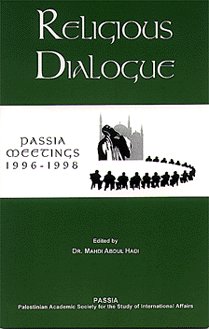Religious Dialogue
This volume is a selection of meetings and lectures that took place at PASSIA over the years 1996-1998 with the intention to serve as a reader for all those interested in religious topics and concerns related to the three monotheistic religions in the Holy Land. The ten pre¬sented papers deal with issues such as the relationship between church and state, Political Islam, Palestinian Christians and Muslims today, Abraham, secularism and religion, and non-Muslims in Muslim societies.
Overview
The fact that in our region the encounter between people of very different religious traditions takes place in the close proximity of cities and neighborhoods, has always given issues pertaining to religion and interfaith matters a special place within PASSIA’s regular meeting program.
Over recent years it has become particularly clear that there is an increased need to address the religious diversity prevailing in the region and to work towards an improved understanding between the various religious communities of the three monotheistic faiths.
Whilst acknowledging that faith must be treated with the utmost sensitivity and sincerity, especially in the Middle East, PASSIA has served for the past few years as one of the main addresses where people can gather in order to engage in rational religious dialogue and learn about other faiths. By providing such a forum, it was always PASSIA’s intention to make a valuable – though hardly visible - contribution to the promotion of the respect of others as well as to the shaping of a pluralistic society where religious diversity is appreciated as part of the heritage of those who live there.
Part of this endeavor’s rationale is PASSIA’s belief that religious differences can be enriching and that each religious tradition makes a distinctive contribution to a society. Religion lies at the heart of nearly every human culture, shaping its identity, values, relationships, and actions. While religion can inspire and unite, it also has the power to divide and destroy. Religious differences have often been a cause of conflict and violence, and even today, religion is being exploited to foster prejudices and discrimination while religious emotions are being used to promote other, non-religious goals.
In the case of the Middle East, tradition has it that the practices of the different religious communities frequently represent opposing political views and powers, which has not only led to hostilities and confrontations but also reinforced national, cultural and ethnic differences. Being aware that the Christian, Moslem and Jewish communities in the region have enormous potential to either encourage peaceful coexistence or support sectarian hatred, PASSIA believes that religious dialogue can help in building bridges and dispelling existing stereotypes. After all, and despite the distinctiveness of the different religious traditions, the three monotheistic faiths have bases of unity among them and others may be discovered in the course of such a dialogue.
By engaging in an open and sensitive dialogue among believers of the different faiths, each side can learn from the other and help promote better understanding and cooperation, while acknowledging their differences. This is particularly important in the case of Palestine and Israel, where the encounter between people of very different religious traditions – each inspired by a unique vision of the divine and with a distinct cultural identity - takes place in the close proximity of cities and neighborhoods. Here, dialogue can help in breaking down walls of fear and prejudice by addressing issues of conflict arising from religious and cultural differences. There will never be peace in the Middle East without peace between the religions, and peace between the religions can only be achieved through dialogue between the people.
This volume is a selection of meetings and lectures that took place at PASSIA over the years 1995-1998. Not included are the many meetings that were held ‘off the record’ and that are not being publicized owing to either the sensitivity of their contents or the reluctance of speakers and/or participants to have the proceedings published. Furthermore, due to limitations of space only the most significant meetings and lectures are included, as part of an effort to keep the scope and content as comprehensive and informative as possible.
It is hoped that this publication will serve as a reader for all those interested in religious topics and concerns related to the three monotheistic religions in the Holy Land. It is also hoped that it will provide a valuable insight into the numerous aspects and debates related to faith and interfaith issues that dominate the discussion in contemporary Palestine.
Jerusalem, December 1998
Dr. Mahdi Abdul Hadi - Head of PASSIA
Introduction
The Relationship Between Church and State:
A Christian Point of View
Dr. Giries Khoury

